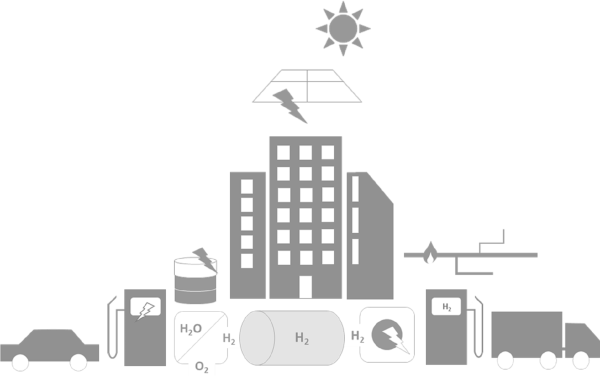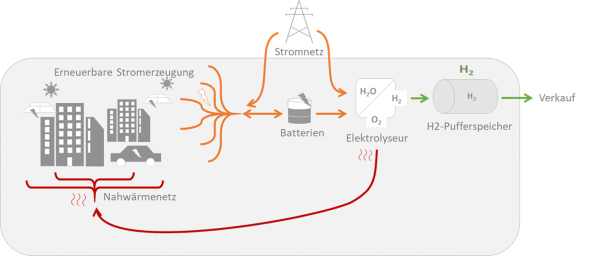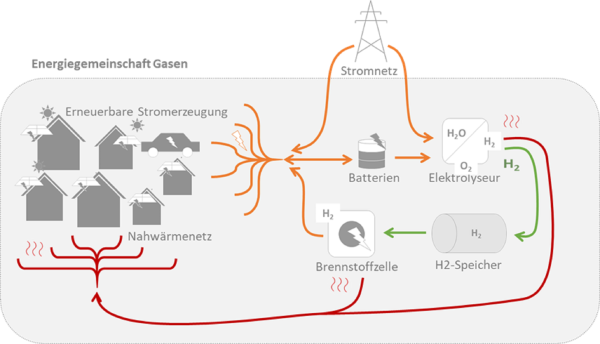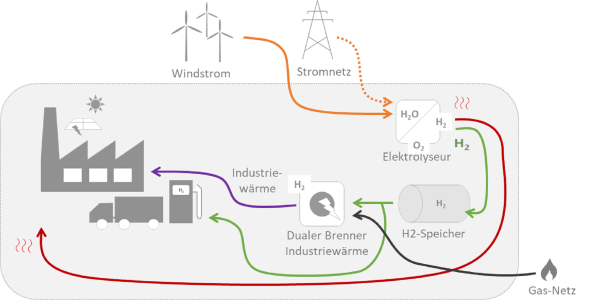IEA TCP AFC Annex 33: Fuel Cells for Stationary Applications (Working period 2022 - 2024)
Short Description
In the task period from 2022 to 2024, the topic 'Use of stationary fuel cells for climate-neutral districts and neighbourhoods' was addressed in a new subtask. The extent to which stationary fuel cells can be used in integrated energy concepts based on renewable energy sources in energy communities or climate-neutral neighbourhoods was investigated.
Specifically, the following questions were addressed:
- Analysis of neighbourhood solutions (mainly abroad or in Annex 33 member countries like Germany) that already rely on decentralized hydrogen solutions. The analyses include the software tools and hardware components that have been used. Furthermore, the success factors that ultimately led to the realization of the project are analysed (with the involvement of the Annex 33 members).
- Analysis of the Austrian situation with the involvement of relevant stakeholders. Austria is leading in renewable energy systems (incl. renewable energy communities or citizen communities), but in decentralized hydrogen solutions Austria is only at the beginning of the developments.
- Modelling and simulation of at least three districts in Austria and development of recommendations for the further promotion of climate-neutral districts, on the one hand for project development, technology providers, software providers and on the other hand for political decision makers (in case of implementation barriers).
The project results primarily confirm the already known crucial role of energy efficiency and the development of renewable energy sources in achieving climate neutrality. In addition, the advantages of using hydrogen technology in neighbourhoods or energy communities in terms of grid serviceability were demonstrated. In this respect, the absorption of surplus renewable electricity in summer and its delayed reconversion into electricity by fuel cells to support the power grid in the event of possible supply bottlenecks in winter in rural areas is a typical application. Even if complete electricity self-sufficiency is not yet realistic, the waste heat from electrolysers or fuel cells can be used in local/district heating networks to cover the district's heating requirements. In districts with buildings with a high energy efficiency standard, complete decarbonization can be achieved in combination with heat pumps. The study also shows a promising use of hydrogen technology for the decarbonization of several applications in industrial areas (industrial heating, mobility, etc.).
In summary, typical applications were identified in Austria for which the technical components are already available. However, the investment costs, space requirements and lack of experience and suitable planning and modelling tools currently represent obstacles to widespread implementation.
The findings from the study were published in the form of a scientific publication and summarized in the form of recommendations, which were presented to the relevant stakeholders in Austria at a results workshop.
Project Images
Terms of use: The pictures listed underneath the header “Project Pictures” originate from the projects in the frame of the programmes City of Tomorrow, Building of Tomorrow and the IEA Research Cooperation. They may be used credited for non-commercial purposes under the Creative Commons License Attribution-NonCommercial (CC BY-NC).
Participants
Austria, Germany, Italy, France, Finland, Japan, Korea, Sweden, USA
Contact Address
Dipl.-Ing. Dr. Günter Simader
Austrian Energy Agency
Mariahilfer Strasse 136 | 1150 Vienna | Austria
guenter.simader@energyagency.at
Dr. Elisabeth Sibille
Austrian Energy Agency
Mariahilfer Straße 136 | 1150 Vienna | Austria
elisabeth.sibille@energyagency.at




